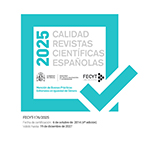Las estrategias de aprendizaje y las metas académicas en función del género, los estilos parentales y el rendimiento en estudiantes de secundaria
Resumen
El objetivo de este trabajo es estudiar la relación entre las estrategias de aprendizaje, las orientaciones a meta y el rendimiento académico de los estudiantes, teniendo en cuenta la influencia de los estilos educativos parentales y las diferencias según el género. El Motivated Strategies for Learning Questionnaire (MSLQ), la Escala de Orientación a Metas y el Parental Bonding Instrument (PBI) fueron administrados a una muestra de 221 estudiantes de Educación Secundaria Obligatoria, con edades comprendidas entre los 12 y los 17 años. Los resultados obtenidos muestran diferencias significativas: primero respecto al género, en la estrategia de organización y en las metas de autoensalzamiento y evitación de la tarea; segundo respecto a los estilos educativos parentales, en estrategias, metas académicas y rendimiento, que favorecen a los estilos democrático y permisivo; y tercero respecto a los niveles de rendimiento, con peores resultados para el nivel de rendimiento más bajo. De este estudio se desprende la necesidad de considerar las variables estudiadas a la hora de orientar a las familias y al alumnado en relación a la mejora del proceso de aprendizaje y el rendimiento académico. Finalmente, se ofrecen conclusiones que serán necesarias tener en cuenta en futuros trabajos en esta línea.Descargas
Descarga artículo
Licencia
La Revista Complutense de Educación, para fomentar el intercambio global del conocimiento, facilita el acceso sin restricciones a sus contenidos desde el momento de su publicación en la presente edición electrónica, y por eso es una revista de acceso abierto. Los originales publicados en esta revista son propiedad de la Universidad Complutense de Madrid y es obligatorio citar su procedencia en cualquier reproducción total o parcial. Todos los contenidos se distribuyen bajo una licencia de uso y distribución Creative Commons Reconocimiento 4.0 (CC BY 4.0). Esta circunstancia ha de hacerse constar expresamente de esta forma cuando sea necesario. Puede consultar la versión informativa y el texto legal de la licencia.











